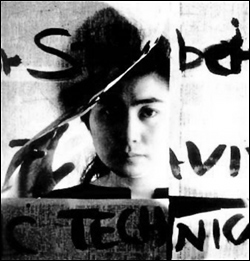A lot of Seattle’s musicians are looking for ways to refresh the classical concert experience: from something as simple as the performers speaking to the audience between works; to Quake’s break-the-fourth-wall spatial experiments and embrace of pop styles; to the Degenerate Art Ensemble’s move from recitals to extended-run theatrical shows. Taking this spirit to a welcome extreme is Seattle School—a collaboration among composers Korby Sears, Mike Min, and Ben Houge—which brings Dadaist showmanship, aggressive audience participation, edgy comedy, and just plain damn-fool stunts to places like Polestar Music Gallery and Consolidated Works. Their first two shows lay somewhere near the intersection of new music, conceptual art, and Beat the Clock: the self-descriptive Fear, Karaoke, Discipline, and Paintball, and HUNG, a “concerto for audience” in which attendees joined in the soundmaking. With a healthy irreverence, they challenge other musicians to reconsider how they serve their listeners. Next, they’ll explore their roots with Grapefruits (8 p.m. Wed., April 7, Capitol Hill Arts Center, www.seattleschool.net), a tribute to Yoko Ono and her early ’60s work with the Fluxus art collective. The three composers sat down recently to discuss with us exactly what they do and why.
Seattle Weekly: What reactions have you gotten so far to your work?
Korby Sears: Ironically, by saying “Fuck all these normal things,” we’re getting normal people to these shows. Some of the works we’ve done split the audience. Mike had a piece called Competition and Distraction. He said he wanted to have a piece where there was fear in the room— so there’s three of us onstage, without protective gear other than helmets, singing three different karaoke songs simultaneously while he shot at us with paintballs. Half the audience was laughing their ass off, but the other half could not watch it.
SW: In this new show, you’re recognizing your aesthetic ancestors.
KS: The Fluxus thing had a lot to do with World War II ending, and the influence of Asian ideas, and the idea of no longer commercializing art as an object. Every once in a while, though, there’s a piece that’s pretty eternal, that the Greeks could have done and it would have made sense. Push [by Fluxus member Ben Vautier] is eternal. Push needs no context. Push is a piece where 10 to 20 performers are onstage and they nonviolently push each other until two people are left. It’s like kinetic sculpture. It’s gorgeous. It has nothing to do with economics or social anything. Dogs can understand Push.
[Ono’s] Sky Piece for Jesus Christ calls for an orchestra to perform a Mozart piece. While they’re performing, people come out and wrap gauze around them—around their fingers, their eyes, their mouth, until they can no longer play. Then the orchestra has to go offstage being blinded and bound, negotiating getting offstage together. I think this is beautiful—what is an orchestra if not people trying to work together?
John Cage was kind of the archangel of the movement, but also things like vaudeville and Duchamp, Spike Jones, children’s games. It started out as a music movement, but I think [Fluxus] actually did Cage’s ideas better than he did. Someone’s biting his lip right now, but Cage was still in the concert realm—Fluxus literally did stuff on the street. 4’33” [Cage’s “silent” piece] was like a reset button, and suddenly everything became theater. Theater and music have separated for way too long, and [Fluxus] kind of brought that back together.
SW: So which do you do? Talk about labels.
Mike Min: I always thought what a composer is essentially doing is notating some kind of athletics for a performer to produce a sound. So I thought, “Why can’t we expand the athletics a little bit?” When musicians start moving around more than you’re used to, is that suddenly theater?
KS: Mike has a piece called Empty Orchestra. It’s like a karaoke deconstruction: We perform the song “A Whole New World” from Aladdin, but don’t make any sound. I have [an electric] piano that I actually play that’s not plugged in. Is that music or theater?
SW: What’s next for you?
Ben Houge: When we’re throwing out ideas for pieces, it’s always interesting to see what gets a rise out of the others. There was a piece Korby said he wouldn’t do—the licking piece.
KS: No, no, I’m in on that. But my initial gut reaction was, “I don’t want to lick my bass.”
BH: Yeah, people are going to lick their instruments. It’s a fetishist thing: “You like classical music so much, your precious classical music? Well, why don’t you lick it?”
KS: My bass has been borrowed by a few people. I don’t know if I want to lick it.
SW: Anything else?
KS: I have a piece for four hamsters. I thought of that last night.







